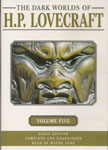
 The Dark Worlds of H.P. Lovecraft Volume 5: Haunter Of The Dark, The Thing On The Doorstep, The Lurking Fear
The Dark Worlds of H.P. Lovecraft Volume 5: Haunter Of The Dark, The Thing On The Doorstep, The Lurking Fear
By H.P. Lovecraft; Read by Wayne June
3 CDs – 3 Hours 20 Minutes [UNABRIDGED]
Publisher: Audio Realms
Published: April 2006
ISBN: 9781897304259
Themes: / Horror / Science Fiction / Collection / Heredity / Supernatural /
I have seen the dark universe yawning
Where the dark planets roll without aim–
Where they roll in their horror unheeded,
Without knowledge or luster or name.
–HP Lovecraft, “The Haunter of the Dark”
Seminal horror author H.P. Lovecraft may have a loyal following, but he also gets a lot of flak for his style–which some describe as overly archaic and distractingly adjective-laced–or by those who approach his short stories looking for a scare, but leave disappointed that he’s not frightening enough.
I think both points have some validity though largely I don’t agree with them. I love Lovecraft’s style, mainly because it’s so darn unique: All it takes is one or two sentences and you know exactly who you’re reading. It also perfectly fits the atmospheric, slow-to-build horror for which he’s known. As for the second criticism, Lovecraft really doesn’t scare me, either. You’re not going to get nasty shocks out of his stories, though I would describe them as occasionally unsettling: He can deliver a good chill and at times evoke strong feelings of dread.
But people who pick up Lovecraft for simple scares are missing the boat. Think of him instead as a dark spinner of stories set in a detailed and grotesque universe of his own creation, a world of dark cults, evil tomes, ancient curses, and formless, tentacled monsters from space. His subject material is just plain cool. Also, Lovecraft has the ability to draw you effortlessly back in time. Born in 1890, Lovecraft set his stories in the 1920s and 30s, when America was a bit wilder and stranger than the place we know today, a country of deeper woods and darker mountains and strange phenomena that science had not explained away.
With that in mind, it’s no surprise that I enjoyed the heck out of The Dark Worlds of H.P. Lovecraft, Volume 5, an audiobook read by Wayne June. The 3 CD set contains three Lovecraft short stories: “The Lurking Fear,” “Haunter of the Dark,” and “The Thing on the Doorstep.” I’ve read quite a bit of Lovecraft, but this was the first time I’ve ever had his tales read to me, and it was a very enjoyable, immersive experience.
All three stories are excellent. “Haunter of the Dark” tells the story of Robert Blake, a horror writer/artist who becomes obsessed over a far off, decrepit church spire spied from his rented studio window. Blake’s investigation reveals the place to be an abandoned, ruined church once used by a dark cult, and now inhabited by something far, far worse.
The best of the three tales is probably “The Thing on the Doorstep,” which features full-blown Lovecraftian goodness. The tale is set in the famous, fictional town of Arkham, and involves Arkham University, the Necronomicon and other assorted monstrous tomes, a strange intermingled race of men and fish-like deep ones, mind control, a descent into an unholy pit “where the black realm begins and the watcher guards the gate,” and much, much more. Although I’ve never read a Lovecraft biography (a fact I hope to rectify soon), I couldn’t help but draw parallels between the author and Edward Derby, the protagonist and victim of the tale. I would imagine that essayists looking to peer inside Lovecraft’s mind have veritable a goldmine to draw from in “The Thing on the Doorstep.”
“The Lurking Fear” is the most straightforward horror tale of the three and explores one of Lovecraft’s recurrent themes, that of cursed blood and hereditary corruption. Here an investigator of the supernatural looks into a strange massacre in the mountainous Catskills region of New York, where a deserted mansion holds the key to an unspoken horror living beneath the earth. The terrors he uncovers leave him a gibbering wreck at stories’ end, a common fate for Lovecraft’s narrators.
Reader Wayne June deserves a lot of praise for delivering the stories with a smoky, menacing, baritone voice perfectly suited to the tales. My only criticism is that I wanted to hear him scream the line, Kamog! Kamog! — The pit of the shoggoths–Ia! Shub-Niggurath! The Goat with a Thousand Young! in “The Thing on the Doorstep,” but he chose to deliver it with a half-whispered shout. But it’s probably for the best, I guess, as hearing such unutterable phrases spoken aloud may have fractured my sanity, or worse, stirred Something That Should Not Be from its uneasy sleep.
Posted by Brian Murphy








